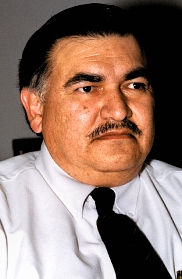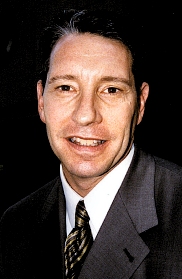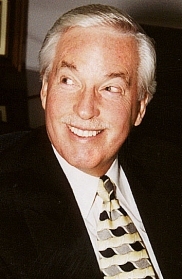


JOHN GUTIERREZ
RICHARD WALMARK
THOMAS WARDEN
Friday, February 22, 2002
Page 5
Los Angeles Superior Court Office No. 100
Ballot Designations, County Bar Ratings Help Shape Three-Way Race
|
|
|
|
|
JOHN GUTIERREZ |
RICHARD WALMARK |
THOMAS WARDEN |
By ROBERT GREENE and KIMBERLY EDDS, Staff Writers
Until Feb. 13, the three-way judicial race for Los Angeles Superior Court Office No. 100 promised to be one of the closest on the ballot, with no clear indication which two candidates might wind up in a November runoff.
Each entrant in the contest lays claim to a portion of those attributes that, on paper, supposedly attract the interest and respect of voters.
For example, prosecutors generally fare well in judicial races, and Deputy District Attorney Richard Walmark is the only one seeking this seat. Young, aggressive, and ambitious, he brings with him a host of law enforcement endorsements, including one from Sheriff Lee Baca.
Workers’ Compensation Judge John Gutierrez carries the magical word “judge” in his ballot designation, giving him at first glance—at least according to the conventional wisdom of campaign professionals—the heft and cachet of incumbency. Plus, he has a Latino name, and voters who take the time and trouble to probe campaign materials will notice that he, too, has served as a prosecutor, however briefly.
Then there is San Fernando Valley trial lawyer Thomas H. Warden, silver-haired and sophisticated looking. Warden brings with him private sector trial experience and a Valley base. He appeared ready to give his two opponents a run for their money.
And then, on Feb. 13, the Los Angeles County Bar Association released its candidate evaluations and Warden was stung with what he said was an unexpected, and unfair, “not qualified” rating. It compares poorly with Gutierrez’s “qualified” rating and Walmark’s “well qualified” mark.
Lowest Rating
Warden was given the lowest possible rating by the County Bar because, the association’s report said, “there are questions pertaining to his integrity and character, and he does not possess the depth and breadth of professional experience.”
Of the 21 candidates running for seven Superior Court judicial seats this year, only one other got the abysmal rating.
Warden, 58, likens it to “losing a child.”
The County Bar does not explain publicly in any kind of detail the reasons that candidates get the ratings they do. Members of the ratings panel contacted by the MetNews declined to discuss the candidate or the process, citing a strict policy of confidentiality.
Warden took part in interviews before Feb. 13 and responded to reporter calls about the evaluation when it first came out. But he has since declined to discuss the matter further and has not responded to requests for a copy of the County Bar’s letter to him explaining the rating.
Warden did say he was asked in his County Bar interview about back taxes owed by a law partnership that dissolved in 2000.
The firm, Warden, Gart & Galen, had its books audited by the Internal Revenue Service for the 1997 tax year. Problems were found, and taxes were owed, but Warden says the partners were advised by tax counsel that the liability did not extend to the individuals. The three lawyers decided not to pay, and they dissolved the partnership.
Ex-partner Jeffrey Galen remembers it about the same way. “There was an outstanding debt that couldn’t be paid,” Galen says, “and there was a liability at the time we dissolved the partnership.”
Galen calls the action a business decision that should not reflect negatively on his former partner, and certainly does not warrant the County Bar statements questioning Warden’s integrity and character.
“Tom Warden is a man of the highest integrity,” Galen says. “I find him incredibly qualified to be a judge.”
Legal Malpractice Suits
There remain other questions. Warden and his firm have been sued several times for legal malpractice dating back to the 1980s. He duly listed four such lawsuits on his County Bar questionnaire. But he omitted a fifth malpractice suit, filed in 1999.
He was also asked by the County Bar to list legal proceedings to which he has been a party. Listed are his three divorces and two auto accidents, one in which his wife was the driver, the other in which it was his step daughter. But he did not list an action in which both he and his firm were sued over a lease.
Records also show that Warden has outstanding tax liens, one in Los Angeles County and one in Riverside County. He told the County Bar he had none.
It is not clear whether the County Bar was most concerned with Warden’s omissions, or with the law firm’s income tax issue. It is possible that Warden’s share in the outstanding tax liability may have looked even more troublesome to evaluators because of his indulgence in one of the most storied symbols of wealth and ostentation.
He bought his first Rolls-Royce in 1974, fulfilling his grandfather’s dream of owning one of the luxury cars. He had no idea where the purchase would lead him.
The 1952 silver beauty took five years to restore. When the work was finally done, Warden had a great conversation piece and a ticket for a membership in the Rolls-Royce Owners’ Club of Southern California. The membership has helped Warden, who focuses his practice on family law, develop a large amount of his business and an addiction to the cars that would lead him to buy nine more in the past 25 years.
In an interview in January, Warden said he planned to get his name out through a website—which has not yet been launched—and by targeting elderly voters through e-mail. He said he anticipated raising $40,000-50,000 and buying space on slate mailers and possibly airing 20-second cable channel commercials. To date, however, his campaign has been a quiet one.
County Registrar-Recorder records show Warden missed the first two filing deadlines, failing to file so much as a short form announcing an intention not to spend more than $1,000. The most recent deadline was yesterday. It could not be immediately ascertained whether Warden met that deadline.
Assessing his chances in the race, the candidate says: “I’m worried about ‘administrative law judge.’” He adds: “Prosecutors have the edge.”
Judicial Appointment
Warden, a Republican, says he applied for a judgeship right before then-Gov. Pete Wilson left office. He discloses that he hasn’t reapplied since Gov. Gray Davis took office. He says he doesn’t have much of a shot of securing an appointment from a Democratic governor, and claims that Judicial Appointments Secretary Burt Pines told him as much.
“He told me not waste the stamp and ink,” Warden says.
A seasoned trial lawyer who spends three or four days a week in the courtroom, Warden says he focuses his practices on the things he enjoys doing, like complex divorce cases. He also handles dependency cases.
Soon after graduating from the University of San Fernando Valley College of Law in 1970, Warden joined the County Counsel’s Office but left after just two years to enter into private practice with two co-workers.
The partnership lasted for 12 years before Warden became a sole practitioner.
“I would give him top marks,” Los Angeles Superior Court Commissioner Mark Weiss says, noting that Warden has frequently appeared before him. He credits Warden with having a demeanor that would make him a credit to the bench.
Six Prosecutors
Walmark, 45, is one of six prosecutors running for Los Angeles Superior Court judge this year, and one of six candidates to engage the professional consulting services of Fred Huebscher of Hermosa Beach.
To Walmark and each of his colleagues in the Huebscher stable, the $3,000 that the consultant charges is a small price to pay for coordinating slate mail and the other campaign basics.
But many of the high-powered endorsements Walmark boasts he got on his own. District Attorney Steve Cooley, for example, who is endorsing other deputies seeking judgeships—but not all of them—says he is happy to back Walmark, whom he knew from his days working in the office’s Van Nuys branch.
“I really have a very strong policy against endorsing candidates,” Cooley explains. “The exception is when the election directly affects the Los Angeles County Superior Court, the county justice system. If they ask, I make a decision in certain cases.”
Walmark asked.
“I don’t know the other two candidates,” Cooley says, “but I know Richard, and I think Richard is qualified to be a Superior Court judge.”
In addition to Cooley and the sheriff, Walmark convinced county Supervisor Yvonne Burke to come aboard.
“He is a county D.A.,” Burke offers by way of explanation, adding that people whom she trusts who know Walmark and his work urged her to back him. Burke says she appreciates the work that Walmark has done in the juvenile justice division in Sylmar.
“I usually look for someone who’s had some public service outside of their work, who’s been involved in the community,” the supervisor says.
San Fernando Valley
Walmark, whom Cooley recently transferred to his high-profile Justice System Integrity Division downtown, has worked much of his 16-year prosecutorial career in the San Fernando Valley, in both Sylmar and Van Nuys, with a stint in between in Pasadena.
He grew up in the Valley, although he was born in Brooklyn. A high school tennis player, he graduated from Grant High in Encino in 1975 and went to UCLA to study political science and to plot a course for either law or business.
Business came first. He worked for Johnson & Johnson as a sales representative, covering a territory that included Los Angeles and San Bernardino counties and extended to Las Vegas.
Business school beckoned, and so did work at the New Brunswick, N.J. headquarters for Johnson & Johnson.
But New Jersey is not what Walmark had in mind and he instead enrolled in Loyola Law School. From there, he went to the District Attorney’s Office and never looked back.
He says he decided to become a judge because he believes the job is the most important one in the courtroom, more important even than the job he has now.
“If two mediocre attorneys are facing each other in the courtroom and there is a good judge, justice has a chance of prevailing,” Walmark says. “If there are two excellent opposing attorneys and a mediocre judge, I believe that justice has a chance of slipping away.”
Walmark asserts that there are mediocre judges on the bench, although he won’t name names. Nor will he criticize or even discuss his two opponents. Suffice it to say, he says simply, that his background, experience and character make him the best person for the job.
Walmark declines to discuss campaign strategy but his actions so far seem to suggest that he is expecting a runoff, and that he will be in it. Fund raising is “moving along” mostly on donations from friends and relatives, but so far has been just enough to cover Huebscher’s fees.
Last Entry
Gutierrez, 53, became the last person to enter this year’s judicial contests, filing only after Judge Reginald Dunn’s last-minute decision not to return nomination papers opened up an additional five-day period for candidates seeking the now-open seat. The other races were already closed.
“I always wanted to be a judge,” he says, noting that he learned about the opening in the coffee room at work, when there were only two days left to file.
“Seeing that we started rather late,” Gutierrez says, “I am hoping to raise approximately $50,000.”
So far, though, Gutierrez has reported contributions of only $3,400 and has paid for little more than the services of his campaign consultant, Mark Siegel. Siegel’s only previous judicial election experience came in the successful 2000 re-election campaign of Judge John Martinez, an incumbent Superior Court judge through unification who was then running only in the former Alhambra Municipal Court district.
A veteran of judicial campaigns, who declines to be identified, says Gutierrez could go a long way with his name and his ballot designation.
It has been some years since a Latino name was widely thought to be an election liability in Los Angeles County, and it now may be a plus, especially given the fact that Gutierrez and Deputy District Attorney Richard Naranjo have the only Latino names in this year’s judicial races.
As for the ballot designation, Gutierrez can accurately call himself an administrative law judge, a title that has the official sanction of the state Court of Appeal courtesy of Superior Court Judge Deborah Andrews.
Andrews was an Unemployment Insurance Appeals Board judge who ran for the Long Beach Municipal Court in 1995 and filed to use the designation “Administrative Law Judge” on the ballot. The registrar-recorder/county clerk balked, citing cases that precluded the use of the word “judge” by court commissioners and anyone else not a member of the state judiciary.
But a Superior Court judge ruled that Andrews was perfectly entitled to use her own statutory job title. It did not matter that the title had been “referee” before 1984. The appeals court agreed.
It likewise does not matter that the California Department of Industrial Relations, which runs the state’s no-fault workers’ comp system, refers on its own website to workers’ compensation “referees.” Workers’ compensation judges were once called administrative law judges, then had their title changed to referee, and are once again identified by statute as administrative law judges.
“There’s been a lot of political description of how we should be described,” Gutierrez says. “The Court of Appeal describes us as judges....We have been called judges, we have been called referees.”
Gutierrez was born in Freeport, Texas and grew up in nearby Clute, the son of a Brazos port stevedore and a homemaker.
Land Dispute
He graduated from high school in Freeport and entered the University of Texas, preparing to be a teacher. But then his father became involved in a land dispute, and Gutierrez describes his own role as being an “intermediary” between his father and the court.
“Something happens and then all of a sudden you are presented with what you are going to do with your life,” Gutierrez says.
He became interested in the legal system and thought about law school. A professor suggested he take a look at schools in California, and he enrolled in 1974 in what was then known as the University of San Fernando. He worked his way through law school with a job in a grocery store.
Gutierrez graduated in 1978. He did not become a State Bar member until 1983.
“I took the bar about four times, maybe five,” he explains. “It’s not an easy bar to pass.”
In the meantime, he had become a small business liaison officer for Teledyne Controls, making certain that small companies with Defense Department contracts got their share of government funds.
After he passed the bar exam, he joined the District Attorney’s Office and was assigned first to downtown, then to East Los Angeles. He did not stay long.
“I left there because I always wanted to be on my own,” Gutierrez says. Using a loan from his father, he set up a solo practice in Eagle Rock, doing criminal defense, personal injury and divorce cases. The practice folded after a year.
Scanning the want ads, he found a position assisting a workers’ compensation lawyer and never left the field. He worked for the State Compensation insurance Fund, then insurer Industrial Indemnity and then, with another loan from his father, he struck out on his own again.
This time he was more successful, opening an office in San Fernando in which he shared staff and office space with another lawyer. He focused on workers’ compensation, with a measure of criminal and personal injury cases as well.
He was hired as a workers’ compensation administrative law judge In 1993.
Gutierrez is the second member of the Workers’ Compensation Appeals Board’s Van Nuys office to seek a Superior Court judgeship this year. He jumped into the race for the seat left open by Dunn several weeks after his colleague, Donald Renetzky, filed to run for judge in another race.
When asked recently, Gutierrez could not name any justices of the Court of Appeal, or the state attorney general. But he says a lack of recent experience in areas outside of workers’ comp would not pose a problem to his serving on the Superior Court.
He explains: “What do judges do? Judges decide cases on issues of law and fact, and that’s what I do every day.”
Copyright 2002, Metropolitan News Company